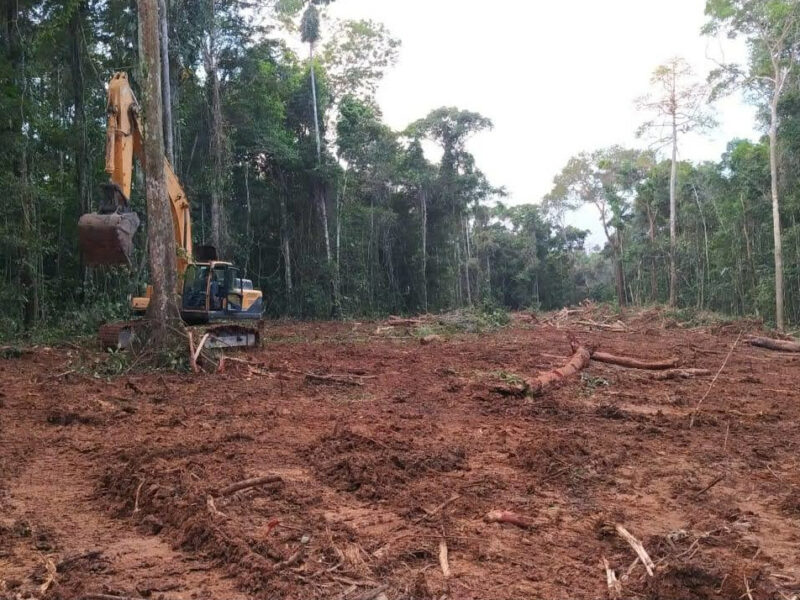Enthusiasm continues to surround the Ecuadorian government’s landmark proposal to keep its largest oil reserve, located beneath Yasuni National Park, in the ground. The proposal, known as the Yasuni-ITT initiative, was first launched over a year ago and has been met with widespread international interest, inspiring the government to extend the deadline for the initial $350 million down payment until December.
The past few months have seen both advances and setbacks in the initiative. Greater guarantees from the Ecuadorian government are still needed, particularly in light of increased pressure on the Park. But the proposal remains a precedent setting effort by an oil-exporting nation to preserve a global biodiversity hotspot, protect indigenous rights, and set the stage for its own economic and energetic shift away from fossil fuels and towards a sustainable economy based on clean, renewable energy.
A Pioneer Proposal
Yasuní National Park is at the turning point in the battle to protect the Amazon rainforest and its indigenous peoples from the environmental devastation caused by oil development. Covering nearly 2.5 million acres of primary tropical rainforest at the intersection of the Andes, the Amazon and the equator, Yasuní is the ancestral territory of the Woarani people, as well as two other indigenous tribes living in voluntary isolation, the Tagaeri and the Taramenane.
As a result of its unique location, Yasuní is an area of extreme biodiversity, containing what are thought to be the greatest variety of tree and insect species anywhere on the planet. In just 2.5 acres, there are as many tree species as in all of the US and Canada combined.
For more than three decades, oil has been a mainstay of the Ecuadorian economy. The result has been widespread pollution, while failing to lift millions of Ecuadorians out of poverty. The Ecuadorian government’s offer to forgo oil development in the ITT (Ishpingo, Tampococha, Tiputini) portion of Yasuni National Park would be a giant first step towards breaking Ecuador’s dependence on oil. This proposal recognizes natural resource conservation and alternative energy, instead of oil extraction, as the sustainable source of Ecuador’s national wealth. In exchange for keeping the crude oil in the ground, the Ecuadorian government has asked for compensation of $350 million a year for 10 years. These funds would be allocated towards environmental and social development programs, helping Ecuador move towards a sustainable economy while preserving the rainforest, and recognizing the rights of indigenous peoples in Yasuni.
The First Donations
On July 22 in the coastal city of Guayaquil, Amazon Watch, along with the national Ecuador campaign Amazonía por la Vida and the Fundación Pachamama participated jointly with the Minister of Foreign Affairs, the Ministry of Energy and Mines, and other government officials in making the first financial contributions to the Yasuni-ITT initiative. Plans are being laid for a similar ceremony in Quito next month when President Rafael Correa will make his own personal contribution.
With Ecuador’s national account now open, the government is launching a countrywide campaign to raise small donations from civil society. Donations will be placed in the “Energy Transition Fund” that would “contribute to guarantee the conservation of one of the most biodiverse places in the world, protect indigenous peoples in voluntary isolation, and provide the foundation for a new model of development.”
Currently, the proposal is seeking funds from a variety of sources—private and public sector donations, debt swaps, carbon bonds issued in the voluntary carbon market for avoided CO2 emissions, and direct investment in specific government development projects (which would have been financed by ITT oil revenues).
International Support
To date, the government has received many international offers of support. On June 26, the German parliament unanimously approved a resolution backing the initiative and committing the government and Chancellor Angela Merkel to financially and politically supporting the proposal, as well as promoting it among EU countries and the Club of Paris. At the request of the German Parliament, President Correa extended the deadline to secure funds until December, and all signs point to another extension if concrete financial advances can be shown.
Additional support has come from the Spanish government, who contributed an initial $4 million dollars towards Yasuni conservation. The Ecuadorian government has had high-level talks with Norway, France, and other EU countries, all of which have expressed support. At the last OPEC summit meeting in Vienna, the organization approved a resolution in support of the Yasuni-ITT proposal and voiced interest in the Correa-Daly Eco Tax. The tax, proposed by President Correa, is based on the concept by environmental economist Herman Daly and suggests that an OPEC imposed carbon tax at the oil wellhead instead of attempted regulation of emissions from the tailpipe would be far more effective in reducing global CO2 emissions. Money generated from the tax would go towards helping countries like Ecuador keep oil in the ground when located under fragile and culturally sensitive ecosystems.
The New Constitution
Ecuador’s new constitution, approved by their Constituent Assembly July 24 and headed for voter approval in September, includes a number of articles that add environmental protections and make resource extraction in national parks like Yasuni more difficult to pursue. The most groundbreaking new protections are the articles on the “Rights of Nature.” The legal concept and its inclusion into the constitution is considered a first among nations. In essence, the articles provide explicit legal protection for the existence of nature and for all of its life cycle functions, including reproduction and evolution. Damage to any of these inherent qualities and functions of nature is prohibited and legal claims can be brought by any individual to stop the damaging activity and restore ecosystem to its original state.
Article 409 of the constitution now bans resource extraction in national parks and areas declared as “areas intangibles,” or no go zones. The exception being areas determined to be of national priority (which Yasuni National Park would no doubt be considered), in which case approval by Congress and/or potentially a national referendum would be required for resource extraction to occur. Additionally, guiding environmental principles such as sustainability, precaution, prevention, responsibility, and participation are included, as wells as specific language regarding climate change and prioritizing emission reductions.
Ongoing Concerns and New Threats
Lingering issues with the Yasuni-ITT proposal remain, however. Over the last few months, the proposal came under criticism as efforts to obtain the first year down payment veered from its original green concept to the more conventional and controversial. The government appeared to obtain a commitment from a coalition of foreign businesses interested in obtaining carbon offsets equaling close to $350 million. However, concerns expressed from national and international NGOs about obtaining all the funds from the selling of environmental services helped bring the proposal and the commitment to a diversity of funding sources back to its original, environmentally friendlier roots. It is now estimated that the government would only obtain 20% of all funding from the selling of carbon bonds.
Additionally, concrete details of government guarantees to donors and potential investors still need to be worked out, including guarantee mechanisms that the oil beneath Yasuni would never be extracted, even under future government administrations. Turnover among personnel leading the Yasuni-ITT initiative has also generated concern, and made coordination and information flow with international groups difficult.
Several external threats to Yasuni continue to undermine donor and investor confidence. The massive Manta-Manos mega project, funded and promoted by Brazil, includes dredging and widening the Napo River, which passes along the Park’s northern border. The creation of an industrial corridor along the Napo waterway would provide Brazil with access to the Pacific Coast and with it, Asian markets. A major player and benefactor of the project is Brazil’s state oil company, Petrobras. The company owns drilling rights in Block 31, located inside Yasuni and adjacent to the ITT oil block. However, oil experts believe that Petrobras’ block 31 is not worth the investment if it cannot also use its infrastructure to access the lucrative oil reserves of ITT. Petrobras has a percentage share in virtually every oil concession in Peru along the Napo River to the border with Ecuador, thus making ITT the linchpin in a Napo River petroleum and transportation corridor. Currently, President Correa has expressed his support for the Manta-Manos project.
News of a new Ecuadorian oil refinery has exacerbated concerns about the seriousness of the Yasuni-ITT proposal. The refinery is slated for construction on the Pacific coast and would allow Ecuador to refine its own heavy crude, ending the economically detrimental practice of exporting crude and importing gasoline and derivatives. Financed by Venezuela, with investment interest from Iran and China, the refinery would require a major boost in oil production to justify its construction. Officials from state oil company Petroecuador and representatives of the Ministry of Energy have made statements concerning Ecuador’s falling oil production and are publicly speculating about making up falling capacity with ITT reserves. However, the President and other factions of the government have made clear that leaving the oil in the ground under the Yasuni-ITT conservation proposal is Ecuador’s first choice.
Toward the Future
Despite these obstacles, the Yasuni-ITT initiative remains one of the most exciting initiatives to come from a country so heavily dependent on oil. Combined with its other green initiatives like new constitutional protections for nature and the environment, Ecuador is leading the way with bold proposals and innovative solutions for a post petroleum world. Hopefully, with greater guarantees from the Ecuadorian government, the international community will rise to meet this unique and critical challenge.













